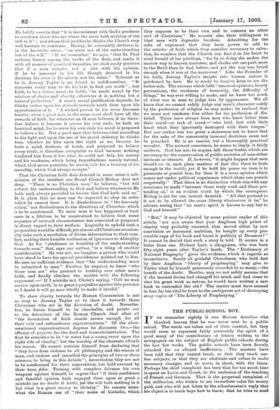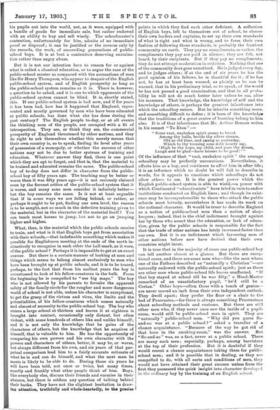THE PUBLIC-SCHOOL BOY.
IF we remember rightly it was Marcus Aurelius who thanked heaven that he was never sent to a public school. The words are taken out of their context, but they would seem to represent fairly accurately the spirit of a good many of the contributors of letters written to the newspapers on the subject of English public schools during the last few weeks. The public schools have been fiercely attacked for an alleged inefficiency. The masters have been told that they cannot teach, or that they teach use- less subjects, or that they are obstinate and refuse to make necessary changes, and to move, in short, with the times. Perhaps the chief complaint has been that far too much time is spent on Latin and Greek, to the exclusion of the teaching of French and German. That is the perpetual complaint of the utilitarian, who wishes to see immediate value for money paid, and who will not listen to the schoolmaster's reply that his object is to teach boys how to learn; that he tries to send his pupils out into the world, not, as it were, equipped with a bundle of goods for immediate sale, but rather endowed with an ability to buy and sell wisely. The schoolmaster's contention, unfortunately for him, admits of no immediate proof or disproof ; it can be justified or the reverse only by the records, the work, of succeeding generations of public. school boys. It is at best a contention deserving examina- tion rather than angry abuse.
But it is not our intention here to reason for or against what is called a classical education, or to argue the case of the public-school master as compared with the accusations of men like Sir Henry Thompson, who appear to despair of the English public-school system, and of English prosperity so long as the public-school system remains as it is. There is, however, a question to be asked, and it is one to which opponents of the public-school system cannot be blind. It is, shortly stated, this. If our public-school system is bad now, and if for years it has been bad, how has it happened that England, repre- sented and mostly governed by men who have been educated at public schools, has done what she has done during the past century? The English people to-day, or at all events the thinking men of the people, are occupied with a fit of introspection. They see, or think they see, the commercial prosperity of England threatened by other nations, and they do right to ask themselves whether this merely means that their own country is, so to speak, finding its level after years of possession of a monopoly, or whether the success of other nations may not be due to better systems of training and education. Whatever answer they find, there is one point which they are apt to forget, and that is, that the material to be trained and educated remains the same. The public-school boy of to-day does not differ in character from the public- school boy of fifty years ago. The teaching may be better or worse than it was fifty years ago—it is not seriously claimed even by the fiercest critics of the public-school system that it is worse, and many sane men consider it infinitely better— but the boy remains the same. Is it not at least arguable that if in some ways we are falling behind, or rather, as perhaps it ought to be put, finding our own level, the reason is to be sought, not so much in the defective training given to the material, but in the character of the material itself ? You can teach most horses to jump, but not to go on jumping higher and higher.
What, then, is the material which the public schools receive to train, and what is it that English boys get from association with their schools,—that indefinable something which makes it possible for Englishmen meeting at the ends of the earth in- stinctively to recognise in each other the hall-mark, as it were, of the public school ? Perhaps it is impossible to get at an exact answer. But there is a certain manner of looking at men and things which seems to belong almost exclusively to men who have been brought up at public schools, and it is to be traced, perhaps, to• the fact that from his earliest years the boy is accustomed to look at his fellow-creatures in the bulk. From the beginning he is compelled to "use big maps." The boy who is not allowed by his parents to forsake the apparent safety of the family circle for the rougher and more dangerous world of school is not able, unless his character is exceptional, to get the grasp of the virtues and vices, the limits and the potentialities, of his fellow-creatures which comes naturally and almost of necessity to the public-school boy. The boy who enters a large school at thirteen and leaves it at eighteen is brought into contact, occasionally only distant, but often violent, with some hundreds of others like and unlike himself; and it is not only the knowledge that he gains of the characters of others, but the knowledge that he acquires of himself, that is valuable to him. He has the opportunity of comparing his own powers and his own character with the powers and characters of others, better, it may be, or worse, but always different from his own, and six years of that per- petual comparison lead him to a fairly accurate estimate of what he is and can do himself, and what the next man he meets is likely to be able to do. During those six years he will have been told, not once or twice, but many times, exactly and frankly what other people think of him. Boys, like everybody else, discuss their friends and enemies in their absence, but there is seldom any question of talking behind their backs. They have not the slightest hesitation in draw- ing attention, truthfully and whole-heartedly, to the precise
points in which they find each other deficient. A collection of English boys, left to themselves out of school, to choose their own leaders and captains, to set up their own standards of what is right and what is wrong, and to form their own fashion of following those standards, is probably the frankest community on earth. They pay no compliments, or rather, the compliments they pay are paid in silence ; they are felt, not heard, by their recipients. But if they pay no compliments, they do not attempt moderation in criticism. Nothing that one of the community does goes unnoticed. He is judged every day,
and he judges others ; if at the end of six years he has the good opinion of his fellows, he is thankful for it ; if he has
not, he has at least been warned, as plainly as he can be warned, that in his preliminary trial, so to speak, of the world he has not passed a good examination, and that in all proba- bility be will not do much better later unless be ca-. alter his manners. That knowledge, the knowledge of self and the knowledge of others, is perhaps the greatest inheritance into which the schoolboy enters. But he inherits something more, and something difficult to define ; it is born of the knowledge that the traditions of a great centre of learning belong to him also. It is of that inheritance that Mr. Arthur Benson writes in his sonnet "To Eton " :—
"Some vast, unshaken spirit seems to brood
Among thy halls, beside thy silver stream, Old as old time, and young as yesterday, Which to thy teeming sons doth hourly say, 'High be thy hope, my child, and pure thy dream, Laugh and be glad—have leisure to be good!"
Of the influence of that "vast, unshaken spirit" the average schoolboy may be perfectly unconscious. Nevertheless, it affects him as a boy, and continues to affect him in after life ; it is an influence which no doubt he will fail to describe in words, for it appeals to emotions which schoolboys do not allow others to see. It is the greatest power which the English public-school system is able to wield,—a power with which Continental " educationists " have tried in vain to endow institutions conducted on English lines ; and though its exist- ence may be incomprehensible to those who attack the public schools most bitterly, nevertheless it has made its mark on the national character. It would be truer to describe England as a nation of public-school men than a nation of shop- keepers ; indeed, that is the chief indictment brought against her by those who assert that the education, or lack of educa- tion, given by the public schools is responsible for the fact that the trade of other nations has lately increased faster than our own. But it is an indictment which far-seeing men of other nations before now have desired that their own countries might incur.
It is true that in the majority of cases one public-school boy can tell another almost at a glance. But there are excep- tional cases, and there are some men who—like the man whom one of the Fathers described as "naturally a Christian "—are naturally endowed with the public-school spirit; just as there are other men whom public-school life leaves unaffected. "If that boy stayed at school till he was fifty," a Head-Master remarked of an unsatisfactory pupil, "he'd still be a Cretan." Other boys—often those with a touch of genius— are never moved an inch from their own independent outlook. They dwell apart; they prefer the floor or a chair to the
bed of Procrustes,—for there is always something Procrustean about schoolboy methods and customs. But there are still other men who, if they never once saw the inside of a pupil- room, would still be public-school men in spirit. They are "naturally" public-school men. "Why did you guess So- and-so was at a public school ? " asked a traveller of a chance acquaintance. "Because of the way he got rid of that bore in the smoking-room," was the answer. But "So-and-so" was, as a fact, never at a public school There are many such men ; especially, perhaps, among barristers at the top of their profession. But it is doubtful if they would resent a chance acquaintance taking them for public. schoolmen; and it is possible that in dealing, as they are compelled to do, with all sorts and conditions of men, they would not have attained their great success unless from the first they possessed the quick insight into character developed in the ordinary boy by the training of an English school.











































 Previous page
Previous page